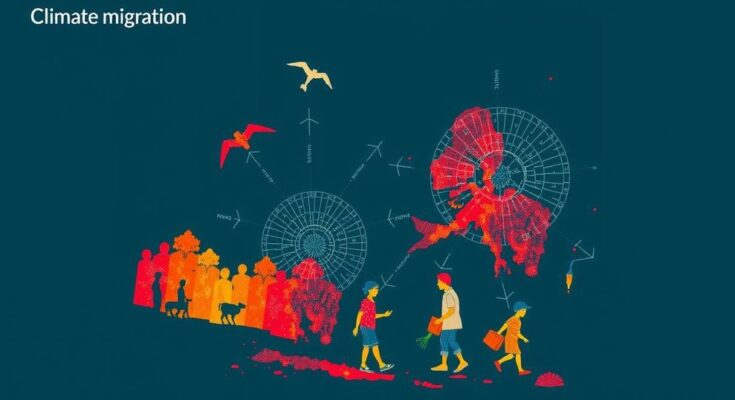Caritas Internationalis and Caritas Indonesia convened in Jakarta to address the critical issue of climate migration exacerbated by climate change. Secretary General Alistair Dutton emphasized the profound impact on vulnerable communities, while Cardinal Ignatius Suharyo highlighted the organization’s ongoing efforts in disaster response and humanitarian challenges. Their collaboration aims to enhance resilience and support for those affected by environmental crises and related social issues such as malnutrition and human trafficking.
In a significant gathering held in Jakarta on October 25, the Secretary General of Caritas Internationalis, Alistair Dutton, addressed the alarming ramifications of climate change, particularly its role in exacerbating climate migration. He underscored that vulnerable populations are increasingly at risk due to the deteriorating conditions caused by climate change. During his visit, which was made possible by arriving from Rome, Mr. Dutton conferred with Cardinal Ignatius Suharyo, the President of the Indonesian Bishops’ Conference and the leader of Caritas Indonesia (Karina KWI). Both parties discussed the pressing need to tackle this international crisis with urgency. Mr. Dutton articulated a critical distinction between conventional migration driven by economic factors and the larger, more profound issue of climate migration. “We are used to talking about migration in economic terms, which actually affects a small number of people,” he remarked, indicating that climate change could displace thousands, if not millions, by rendering the earth less habitable. He further noted that dwindling fertile land and resources pose an imminent threat of extensive forced migrations. Indonesia, situated in the ‘Ring of Fire,’ is especially susceptible to such adverse effects due to its frequent geological disturbances, including volcanic eruptions and earthquakes. Cardinal Suharyo elaborated on the founding of Caritas Indonesia, which arose in 2006 following a devastating earthquake in the Semarang region that resulted in over 5,700 fatalities and extensive damage amounting to 4.5 billion USD. The establishment of Caritas Semarang, locally known as Karina KAS, was a direct response to this disaster, coordinated by local parishes and led by the late Bishop Johannes Pujasumarta, renowned for his profound compassion. The meeting represented a renewed commitment to collaboration between Caritas Internationalis and Caritas Indonesia, focusing on humanitarian crisis management and disaster preparedness to foster a more secure and dignified environment for both Indonesian citizens and migrants. The presence of notable figures such as Mgr. Aloysius Sudarso, the President Emeritus of Caritas Indonesia, as well as Executive Director Fr. Freddy Rante Taruk, highlighted the unity and purpose of their mission. Recently, Caritas Indonesia initiated a campaign targeting malnutrition on the island of Sumba in East Nusa Tenggara province (NTT), successfully distributing food packages to 373 mothers and children, alongside six pregnant women in the Weetebula diocese. Furthermore, Fr. Freddy Rante Taruk detailed the foundation’s engagement in combating human trafficking, a significant issue impacting many Indonesian migrant workers.
The meeting between Caritas Internationalis and Caritas Indonesia occurs under the backdrop of an escalating global climate crisis that disproportionately impacts the most vulnerable communities around the world. Caritas Internationalis, a global network of Catholic relief organizations, seeks to address these challenges by addressing the root causes of migration, advocating for vulnerable populations affected by natural disasters, and providing humanitarian aid. Caritas Indonesia, founded in the wake of a natural disaster, strives to mitigate the impacts of such emergencies through various initiatives, including combating malnutrition and human trafficking. The acknowledgment of Indonesia’s geological vulnerabilities adds urgency to these discussions and highlights the nation’s need for comprehensive disaster response mechanisms.
The discussions between Alistair Dutton and Cardinal Ignatius Suharyo highlight a critical intersection of climate change and migration, particularly for Indonesia, which faces unique and dire challenges due to its geographic disposition. The cooperation between Caritas Internationalis and Caritas Indonesia signifies a proactive approach to addressing humanitarian crises while emphasizing the need for swift action to alleviate the suffering of displaced communities. As these organizations work together, their efforts to combat malnutrition and human trafficking are vital components of a broader strategy to support vulnerable populations amid changing environmental conditions.
Original Source: www.asianews.it




